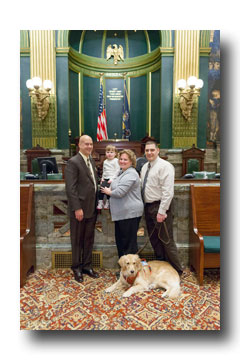May 2015Dear Friend, I am pleased to send you this edition of my electronic newsletter. These e-newsletters enable me to provide information about issues, events and activities in Harrisburg and around the 32nd Senatorial District to you in a timely manner while saving postage costs. If you find this e-newsletter useful, I invite you to visit my website www.senatorstefano.com for more information about your state government. You can also keep up to date through Facebook (www.facebook.com/senatorstefano) and Twitter (www.twitter.com/senatorstefano). If you do not wish to receive these e-newsletters, please click the "unsubscribe" button at the bottom of the page. Sincerely, Pat Stefano Stefano Supports Senate Passage of Bill to Legalize Use of Medical CannabisI recently voted for legislation that would allow Pennsylvania physicians to prescribe medicinal cannabis to their patients for certain health conditions. Senate Bill 3 was approved overwhelmingly by a bipartisan vote of 40-7. Under Senate Bill 3, the non-smoked and non-hallucinogenic form of the medicine would be administered under strict regulation and under medical direction. Medical cannabis has proven effective across the nation to treat children with extreme seizure disorders and patients with other health conditions. This bill will provide Pennsylvanians with much-needed access to the natural plant and give them with a resource that could help them regain their health. One of these children was Sydney Michaels, from Connellsville, who was the subject of articles in newspapers both locally and across the commonwealth. Last year Sydney's mom, Julie, spoke to my Rotary group and I was deeply touched by her story. I am proud to support this legislation on behalf of Sydney, her family, and many other Pennsylvanians who will benefit from this treatment. Senate Bill 3 would allow individuals who suffer from certain medical conditions to apply for a medical cannabis access card from the Department of Health. A licensed health care practitioner would be required to provide written certification in order for an application to the Department of Health to be considered. The legislation creates a new Board of Medical Cannabis Licensing within the Department of State that will be responsible for regulating growers, dispensers and processors. The use of medical cannabis offers tremendous potential as a safe and effective treatment for many those suffering from chronic illness. This bill will provide access to medical cannabis in a safe and well-regulated manner.” Senate Bill 3 now goes to the House of Representatives for consideration. Stefano Supports Passage of Historic Pension Reform BillEarlier this month, I voted for passage of an historic pension reform measure that will protect benefits earned by retirees and current employees while shielding taxpayers from further risk. Senate Bill 1, which I co-sponsored, would reduce long-term costs to taxpayers by creating a 401k-style pension system for newly hired employees who are eligible to participate in one of the state’s two public employee pension systems – the State Employees’ Retirement System and the Public School Employees’ Retirement System. The bill would not affect benefits already earned by current employees or retirees. However, current employees would be given the option to either increase their contribution rate or accept a reduced benefit going forward. Retirees would not be affected by Senate Bill 1. State pension payments are scheduled to increase by $1 billion this year alone, placing a huge and unsustainable burden of state and local governments that will result in higher local property taxes, less money for worthwhile state programs and fewer education dollars available to help students in the classroom When I was elected to the State Senate, I chose not to join the pension system because he had such grave concerns about its sustainability. Action on Senate Bill 1 will address those long-standing concerns. A non-partisan analysis by the Public Employee Retirement Commission determined the measure would save $18.3 billion over the next 30 years. It provides seven times more savings for the Commonwealth and school districts than the Governor’s proposal, which would increase the Commonwealth’s debt by $3 billion. The bill would require lawmakers to participate in the same pension system as newly hired employees. It also creates a new commission to study investment options and fees associated with managing pension system assets. Senate Bill 1 was sent to the House of Representatives for consideration. Facts About Senate Bill 1
Senate Bill 76 Provides Real Property Tax ReformMany media outlets and organizations have mischaracterized Gov. Wolf’s property tax proposal, which is part of his massive $34 billion budget paid for by a $4 billion tax increase, as similar to Senate Bill 76, a property tax reform bill I support. At first blush, one may think that the governor’s proposal and SB 76 are the same. They are most definitely not. Under SB 76 school property taxes are eliminated. Under SB 76 never again will school property taxes drive someone from their home, which I heard too often going door to door last year. Under SB 76, a prospective homebuyer won’t be dissuaded from moving into our community because of crippling property taxes that often times are higher than the mortgage. Under SB 76, property taxes will not keep rising, making you merely a renter from the government in the home you own. Under Gov. Wolf’s proposal, the property tax remains and will continue to rise in the future erasing any short term property tax relief that has been promised. The end result? Eventually, you will pay a higher income tax, a higher sales tax on more items and still be under the heavy thumb of property taxes. What does this mean for the 32nd District? According to analysis done by the House Appropriations committee, it means Fayette County residents will pay nearly $2.7 million in higher taxes, Somerset County residents will pay 10.2 million in higher taxes and the residents in Westmoreland County within the 32nd District will pay $6.4 Million in new taxes. All of this occurs while Philadelphia receives a $32 million tax break. You can see your school districts overall tax burden at www.taxpayersthatpay.com. I applaud Gov. Wolf for rightly pointing out that property taxes are a problem; I just don’t believe his solution is the right approach. If we go along with his plan, we will forever lose the ability to end the school property tax once and for all. If we are to finally change the way we fund our schools, we must protect residents from future tax increases. Everyone remembers the grand promises made when gambling was instituted in Pennsylvania. Property tax relief was used to sell casinos to the public. Ten years later, people are always asking me where the property tax relief went. The fact of the matter is, property tax relief did happen. It was just far eclipsed by property tax increases that were imposed by local school boards to deal with the growing pension crisis among other priorities. The only way to stop this from happening again is through a dollar for dollar decrease in the property tax. Any proposal that leaves the property tax on the table without protections from future property tax increases should be looked at for what it is: A good intentioned, but ultimately, temporary tax relief proposal. |
Offices
Senate Box 203032
171 West Crawford Ave
118 West Main Street |
|
If you do not wish to receive this email, click
here
to unsubscribe. |
|



